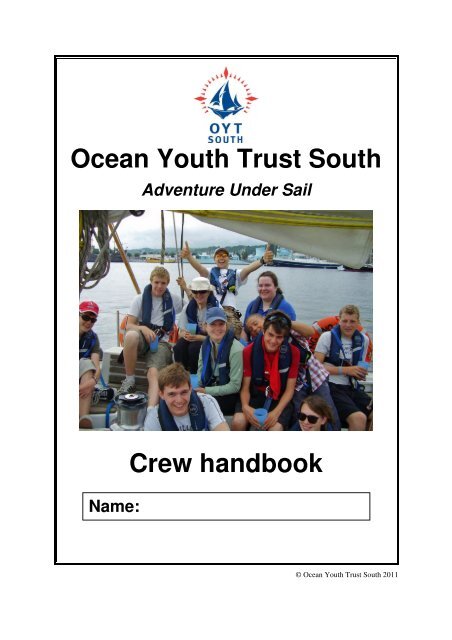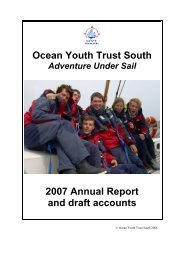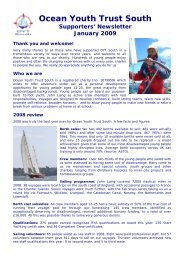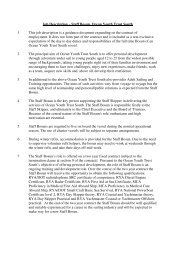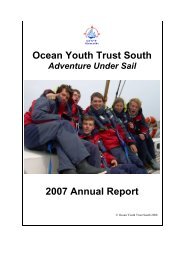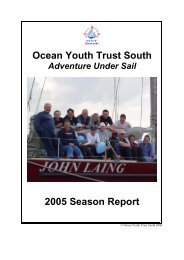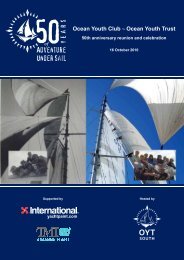Ocean Youth Trust South Crew handbook
Crew handbook (pdf) - Ocean Youth Trust South
Crew handbook (pdf) - Ocean Youth Trust South
- No tags were found...
You also want an ePaper? Increase the reach of your titles
YUMPU automatically turns print PDFs into web optimized ePapers that Google loves.
<strong>Ocean</strong> <strong>Youth</strong> <strong>Trust</strong> <strong>South</strong><br />
Adventure Under Sail<br />
<strong>Crew</strong> <strong>handbook</strong><br />
Name:<br />
………………………………<br />
© <strong>Ocean</strong> <strong>Youth</strong> <strong>Trust</strong> <strong>South</strong> 2011
What you need to bring<br />
Please pack your kit in a soft bag<br />
– there’s no space to store a hard suitcase!<br />
• Passport or Identity Card (we may go abroad even on a short trip – but check with the<br />
office first if you are concerned about the trouble or expense of getting a passport)<br />
• EU health insurance card (for medical cover in Europe - apply at the Post Office)<br />
• Sleeping bag<br />
• Pillow<br />
• Warm clothing (even in summer it can be cold at sea)<br />
• Warm hat and gloves<br />
• Waterproof footwear (wellies are fine if soles are non-slip)<br />
• Trainers or deck shoes with non-slip soles<br />
• Underwear<br />
• Clothes to wear ashore<br />
• Wash kit (NB aerosols are a serious fire hazard and NOT allowed on board – bring<br />
roll-on deodorant)<br />
• Wet wipes (optional - but there are limited opportunities for showers)<br />
• Towel<br />
• Any regular medication / inhalers (you MUST tell our office in advance what you are<br />
taking)<br />
• Seasickness pills<br />
• Glasses or contact lenses if needed (NB bring spares; contact lens cleaning solution;<br />
a strap to hold your glasses on)<br />
• Swimming kit (you can’t swim off the boat or beach with no lifeguard, but we may go<br />
to a pool)<br />
• Sun cream, sunhat (e.g. baseball cap), sunglasses, shorts<br />
• Personal belongings such as camera, torch, diary<br />
• CDs (optional – and will other people like your taste in music?)<br />
• Pocket money (English money certainly, and Euros if you like)<br />
• RYA logbook (if you have one. Useful for building sailing qualifications. Available on<br />
board for £5)<br />
• Duke of Edinburgh Award book (if you have one)<br />
• Remember, energy drinks such as Monster and Red Bull are not allowed on the boat,<br />
and we ask people to bring only a small amount of sweets.<br />
Waterproof clothing, safety harnesses and lifejackets are provided on board.<br />
There are also a few warm fleeces for people to borrow if you get really cold.<br />
2
Introduction<br />
We hope you will have a fantastic time sailing on board John Laing.<br />
Every voyage is different – we can’t predict what the weather will be like,<br />
where we will go, or who you will meet. But whether or not you have<br />
sailed before, whether you are coming on your own or with a group of<br />
people you know, and whatever happens on your particular trip, we hope<br />
that you will learn a lot, stay safe, and above all have fun.<br />
This booklet has been produced to give you a better idea of what to<br />
expect when you come on board. You don’t have to learn it off by heart,<br />
there’s no exam when you arrive, but if you take the time to look through<br />
it, it should help you when the trip begins. There is also a lot of useful<br />
information on our website, www.oytsouth.org (click on “How to sail with<br />
us”, near the top of the menu).<br />
If you still have questions and you need answers before the voyage,<br />
please call the office on 02392 602278, or email office@oytsouth.org.<br />
Before the voyage starts<br />
It’s really important to tell us in advance anything about yourself that<br />
might affect you on the boat – medical or other conditions, allergies, any<br />
medication you are taking, faith-based food restrictions, anything which<br />
will make it easier for us to help you enjoy the voyage. If you are unsure<br />
about whether something is relevant, please call our office and ask.<br />
Next, make sure you know exactly where the boat is and what time you<br />
are meant to arrive. If for any reason you haven’t got a copy of your<br />
Joining Instructions, please call the office and check.<br />
Please try not to be late as we want to get on with the introductory<br />
briefings and then go sailing! But if you do get held up, call the boat on<br />
07990 518915 and make sure they know what’s happened to you.<br />
It’s not usually a good idea to arrive too long before the advertised start<br />
time. We’ll probably be completing jobs from the previous voyage,<br />
finishing the voyage preparations, or doing essential maintenance. If you<br />
can’t avoid arriving early, perhaps because you’re travelling a long<br />
distance, let us know and we’ll try to sort something out.<br />
3
Life on board John Laing<br />
When you arrive, you’ll find your<br />
bunk and somewhere to stow your<br />
gear, and you’ll meet the staff and<br />
other crew members.<br />
Next is the skipper’s introductory<br />
chat. This is designed to make you<br />
feel at home on board John Laing,<br />
and to tell you some of the basics<br />
about living on board.<br />
The key thing is to encourage you to make the most of the voyage:<br />
whatever energy and enthusiasm you put in, the sea staff will match and<br />
beat it.<br />
Then you’ll be divided into teams, or<br />
watches, with one of the staff as your watch<br />
leader. You’ll be given waterproof gear,<br />
lifejacket and safety harness. You’ll learn<br />
how they work and how to fit them; there will<br />
be a safety briefing; and you’ll be shown<br />
round the boat above and below decks.<br />
By this stage everyone is probably anxious to get sailing. We don’t<br />
always set off on the first day – it depends very much on what time it is<br />
when we finish the briefings, and on what the weather is like.<br />
We’ll all get together to talk about where<br />
we want to go, given the weather, the<br />
tide and the strength of the crew. In a<br />
weekend trip, it’s probably a short hop<br />
down the coast. In a week, we might go<br />
further along the English coast, or<br />
perhaps we’ll be able to sail to France or<br />
the Channel Islands.<br />
Of course, if you’ve booked on a leg of the Tall Ships Race, or one of our<br />
other special voyages, we will be going a bit further afield!<br />
4
We’ll motor out of harbour and then the<br />
crew will start getting the sails up. This<br />
may happen quite slowly the first time,<br />
as most people won’t have done it<br />
before. We aim to explain everything,<br />
rather than just giving orders.<br />
Unless it’s just a short trip, one watch<br />
will now take charge of the boat and<br />
the others will be off duty for a few hours. The watch on deck will be<br />
steering, adjusting sails, keeping lookout, and helping with navigation.<br />
We might keep sailing through the night, which can be an amazing<br />
experience under clear starry skies, with each watch taking their turn<br />
while the others sleep.<br />
Whether we’re sailing or not, the boat’s<br />
daily routines continue. Each meal is<br />
normally cooked by two crew members,<br />
with the help of one of the sea staff. Don’t<br />
panic if you can’t imagine yourself<br />
cooking a meal for 18 people – it’s a<br />
great way to learn!<br />
Whenever we visit a harbour during the voyage, we’ll aim to give<br />
everyone chance to go ashore, look around and buy souvenirs. We<br />
might organise a trip to see some local attraction, or we could have a<br />
BBQ on the beach, with football or other games.<br />
By the time the voyage ends, you should be confidently playing your part<br />
in the team, helping to sail the boat. You might well have earned a<br />
certificate; you will probably have<br />
done at least one thing you never<br />
thought you’d be able to do – and<br />
you are likely to have made several<br />
good friends.<br />
Many people enjoy sailing with<br />
<strong>Ocean</strong> <strong>Youth</strong> <strong>Trust</strong> <strong>South</strong> year after<br />
year – we hope that you will be one<br />
of them!<br />
5
6<br />
John Laing below deck
Some common sailing terms<br />
• Bow - the front of the boat<br />
• Stern - the back of the boat<br />
• Port - left (when you are facing the bow)<br />
• Starboard - right (when you are facing the bow)<br />
• Galley - kitchen<br />
• Heads - toilet<br />
• Saloon - living area, with the table where we eat<br />
• Forepeak - inside the boat at the bow, where ropes and<br />
fenders are kept<br />
• Halyard - a rope attached to the top of the sail for<br />
hoisting it<br />
• Sheet - a rope attached to a bottom corner of the sail<br />
to adjust the angle of the sail to the wind<br />
• Reef - make a sail smaller in stronger winds<br />
• Tack (two meanings)<br />
- (1) the lower front corner of a sail<br />
- (2) to turn the boat so that the bow goes<br />
through the direction of the wind<br />
• Gybe - to turn the boat so that the stern goes<br />
through the direction of the wind<br />
• Aft - towards the stern<br />
• Main mast - the taller mast<br />
• Mizzen mast - the smaller mast, near the stern<br />
• Jib / headsail - the sail nearest the bow<br />
• Staysail - the sail between the jib and the main mast<br />
• Mainsail - the sail hoisted on the main mast<br />
• Mizzen sail - the sail hoisted on the mizzen mast<br />
• Boom - the metal pole along a sail’s bottom edge<br />
• Foredeck - the area in front of the mainmast<br />
• Fender - inflated object hung down the side of the boat<br />
when alongside, to protect the hull<br />
• Stanchions - the “fence posts” around the side of the boat<br />
• Shrouds / stays - the wires which support the mast<br />
(Don’t worry about learning all this by heart, it’s just for information!)<br />
7
Knots<br />
If you want to practise one thing before you come sailing, which will be<br />
useful right from the start of the voyage, it’s well worth learning to tie a<br />
few knots.<br />
The Round turn and two half hitches is often used on board:<br />
The round turn and two half hitches<br />
is used for attaching a rope to a bar,<br />
post or ring – you could practise<br />
tying it round different things. We<br />
use it for tying fenders on to the<br />
boat.<br />
Another key knot is the Bowline:<br />
The bowline is used to make a loop that<br />
will not slip. Practise tying it with the loop<br />
going round or through something. We<br />
use it on board for attaching sheets to<br />
the headsail, or on the end of mooring<br />
lines.<br />
If you are interested in practising all eight knots required by the<br />
Competent <strong>Crew</strong> syllabus, you can find the rest on our website, where<br />
the pictures are animated so you can see how to tie them. It’s at:<br />
http://www.oytsouth.org/how-to-sail-with-us/sailing-qualifications.asp.<br />
8
Who’s who?<br />
John Laing normally sails with 12 crew and 5 or 6 adult sea staff.<br />
The skipper is in charge: he or she is responsible for the overall running<br />
of the vessel, and has the final say in everything.<br />
There will be three or four mates, who back up the skipper and help to<br />
run the watches. One of them will be your watch leader.<br />
The bosun is responsible for maintenance on the boat.<br />
The crew is you and up to eleven others. John Laing carries no<br />
passengers: we are all in this adventure together, and you are part of the<br />
team, just as much as the sea staff.<br />
Living and working together<br />
The main thing we ask of you is that you come prepared to join in and<br />
have a good time.<br />
We do not have long lists of rules and regulations, but in order to ensure<br />
that everyone has a safe and enjoyable voyage, we all (including the sea<br />
staff) agree to the following – both on the boat and when we go ashore.<br />
• I will treat others with respect and consideration<br />
• I will follow all safety instructions<br />
• I will not engage in criminal or anti-social behaviour<br />
• I will co-operate and participate in all activities<br />
• I understand that the skipper has the final say in all disputes and<br />
can send anyone home who does not co-operate with the smooth<br />
running of the vessel<br />
The sea staff also make you an extra promise:<br />
Whatever enthusiasm and effort<br />
you put into the voyage,<br />
the sea staff will match and beat it<br />
9
Some common questions and answers<br />
I’ve never been sailing before and I’m worried about not knowing<br />
what to do. We have several complete beginners almost every week.<br />
The staff will explain things, show you how to join in, and let you practise.<br />
There will always be something you can enjoy and which you can get<br />
quite good at during a voyage.<br />
What’s the food like? Everyone helps with the cooking but don’t worry if<br />
you can’t cook – you won’t have to do it on your own. We eat things like<br />
spaghetti bolognese, pasties and beans, pizza or curry. Make sure you<br />
tell us in advance if you are allergic to anything, vegetarian/vegan, or<br />
can’t eat certain foods for religious reasons.<br />
What about toilets and showers? Boat toilets look just like normal<br />
ones but are flushed in a different way to toilets ashore – it will all be<br />
explained when you arrive. There are no showers on board but there are<br />
showers you can use in many harbours.<br />
What if I get ill? At least one of the staff will be trained in dealing with<br />
illness or injury at sea; and we’ll get you to a doctor ashore as quickly as<br />
possible if necessary. You do need to tell us in advance about any<br />
condition you already have. We’ve had people on the boat with anything<br />
from mild asthma to serious disabilities. Bring any medication, inhalers<br />
(and spares) which you need - and tell the staff what you are taking.<br />
How fast does the boat go? Our average sailing speed is about 6 knots<br />
(nautical miles per hour) – that’s almost 7 land miles per hour. The<br />
maximum speed under sail can be well over 10 knots. Under engine the<br />
maximum is actually less: only 7 or 8 knots. But sailing is more fun than<br />
motoring, so even in light winds we often sail – rather slowly!<br />
Where will we go? This totally depends on wind and weather, and what<br />
the crew (that’s you) wants to do. It’s no good planning to go somewhere<br />
if the wind is in exactly the wrong direction – or if the forecast says the<br />
wind would be wrong for coming back!<br />
How can I build up sailing qualifications? Bring your RYA logbook if<br />
you have one (if not you can buy one on board for £5.00). It allows you to<br />
keep track of all your sailing and your qualifications. You can work for a<br />
Competent <strong>Crew</strong> or Start Yachting certificate on board John Laing, and<br />
the sea staff will be able to advise you on how to go on from there.<br />
10
I have a special interest in navigation / engines / weather etc. Tell<br />
your watch leader at the start of the trip, and we’ll make every effort to<br />
help you learn more about anything which particularly appeals to you.<br />
Can I work towards my Duke of Edinburgh Gold Award on board?<br />
The voyage can count as your residential. Make sure you bring your<br />
record book along, and tell the skipper or your watch leader at the start<br />
of the trip – then we can set you some goals and watch your progress.<br />
Will I be seasick? Some people may be seasick but it hardly ever lasts<br />
more than a day or two. Bring your own seasick pills (ask your chemist<br />
for advice, especially if you are taking other medication). Some types can<br />
make you drowsy. Read the instructions: when to take the pills, how<br />
many and how often. And tell the staff on board what you are taking.<br />
Can we go ashore? There are normally opportunities to go ashore in<br />
some of the ports we visit, for showers, shopping, beach BBQs or visits<br />
to interesting local sights.<br />
Some important facts you need to know<br />
Smoking is not allowed below deck. It endangers everyone on board.<br />
This is so serious that anyone caught smoking below deck will be sent<br />
home with no further warning. If you must smoke, you will be allowed to<br />
do so on deck at the skipper’s discretion, in designated areas only.<br />
Alcohol: There is a no-alcohol policy on board John Laing. Those aged<br />
over 18 may only drink ashore at the skipper’s discretion, provided noone<br />
(staff or crew) exceeds the drink-driving limit. No-one should drink<br />
alcohol within 8 hours of sailing.<br />
Illegal drugs are not acceptable on board. Anyone found with illegal<br />
drugs will be sent home, and we will inform the police.<br />
Mobile phones are allowed on the boat but crew members are not<br />
encouraged to bring them as it can be distracting or dangerous if they<br />
ring during a manoeuvre – e.g. if it prevents you hearing a vital<br />
instruction. Phones will be collected in at the start of a voyage, and made<br />
available to crew members when it is OK to use them. They cannot be<br />
used on deck when the vessel is under way; they will not work when the<br />
vessel is offshore; and they can easily get wet or damaged.<br />
Energy drinks such as Monster or Red Bull are not allowed on the boat<br />
because they have an adverse effect on some people’s behaviour.<br />
11
Sailing Qualifications<br />
The Royal Yachting Association runs a system of sailing qualifications<br />
that will take you all the way from novice crew member to ocean<br />
yachtmaster. (These are quite different from the RYA dinghy sailing<br />
qualifications). All the details are listed in the RYA G15 cruising logbook<br />
which can be bought on board for £5.<br />
In a voyage of five days or more on board John Laing, you can do the<br />
Competent <strong>Crew</strong> certificate. On shorter trips, you can still do the Start<br />
Yachting certificate. Both qualifications can be earned by putting in a little<br />
extra effort on a normal voyage. To get either certificate, you need to get<br />
all the relevant sections signed in your logbook. If you don’t complete all<br />
of them, you can finish the rest on another voyage.<br />
If you don’t want the logbook or certificate, you can still get the sections<br />
signed off here in this booklet so you’ll have something to show for your<br />
efforts on board.<br />
Competent <strong>Crew</strong> certificate<br />
(minimum 5 days on board)<br />
Section Details Skipper’s<br />
signature<br />
1 Knowledge of sea<br />
terms and parts of<br />
the boat, her rigging<br />
and sails.<br />
Sufficient knowledge to<br />
understand orders concerning the<br />
sailing and day to day running of<br />
the boat.<br />
2 Sail handling Bending on, setting, reefing and<br />
handling of sails. Use of sheets<br />
and halyards and their associated<br />
winches.<br />
3 Ropework Handling ropes, including coiling,<br />
stowing, securing to cleats and<br />
single and double bollards.<br />
Handling warps. Ability to tie the<br />
following knots and know their<br />
correct use: figure of eight, clove<br />
hitch, rolling hitch, bowline, round<br />
turn and two half hitches, single<br />
and double sheet bend, reef knot.<br />
12
4 Fire precautions and<br />
fighting.<br />
5 Personal safety<br />
equipment<br />
Awareness of the hazards of fire<br />
and the precautions necessary to<br />
prevent fire. Knowledge of the<br />
action taken in the event of fire.<br />
Understands and complies with<br />
the rules for wearing of safety<br />
harnesses, lifejackets and<br />
personal buoyancy aids.<br />
6 Man overboard Understands the action to be<br />
taken to recover a man<br />
overboard.<br />
7 Emergency<br />
equipment<br />
8 Manners and<br />
customs<br />
Can operate distress flares and<br />
knows how they should be used.<br />
Understands how to launch and<br />
board a liferaft.<br />
Understands the accepted<br />
practice with regard to: use of<br />
burgees and ensigns, prevention<br />
of unnecessary noise or<br />
disturbance in harbour including<br />
courtesies to other craft berthed<br />
alongside. Aware of the<br />
responsibility of yacht skippers to<br />
protect the environment.<br />
9 Rules of the Road Is able to keep an efficient<br />
lookout at sea.<br />
10 Dinghies Understands and complies with<br />
loading rules. Is able to handle a<br />
dinghy under oars.<br />
11 Meteorology Awareness of forecasting and the<br />
Beaufort Scale.<br />
12 Seasickness Working efficiency unaffected/<br />
partially affected / severely<br />
affected by seasickness (delete<br />
as applicable).<br />
13 Helmsmanship and<br />
Sailing<br />
Understands the basic principles<br />
of sailing and can steer and trim<br />
sails on all points of sailing. Can<br />
steer a compass course, under<br />
sail and motor.<br />
14 General duties Has carried out general duties<br />
satisfactorily on deck and below<br />
decks in connection with the daily<br />
routine of the vessel.<br />
13
Start Yachting certificate<br />
(minimum 2 days on board)<br />
Section Details Skipper’s<br />
signature<br />
1 The yacht Basic knowledge of sea terms, parts of a<br />
boat, her rigging and sails.<br />
2 Ropework Able to tie the following knots: figure of<br />
eight, round turn and two half hitches,<br />
bowline.<br />
Securing a rope to a cleat.<br />
Use of winches and jamming cleats.<br />
3 Underway Has experienced sailing a yacht on all<br />
points of sail.<br />
Can steer a yacht under sail or power.<br />
4 Rules of the<br />
Road<br />
Can keep an efficient lookout at sea.<br />
5 Meteorology Knows where to obtain a weather<br />
forecast.<br />
6 Man overboard<br />
recovery<br />
Understands the action to be taken to<br />
recover a man overboard.<br />
7 Clothing and<br />
equipment<br />
Understands and complies with the rules<br />
for the wearing of safety harnesses,<br />
lifejackets and personal buoyancy aids.<br />
8 Emergency<br />
equipment and<br />
precautions<br />
Is aware of hazards on board a yacht.<br />
Knows the action to be taken in the event<br />
of an emergency.<br />
14
What people say about our voyages<br />
“Thank you very much for providing such a fantastic experience. I thoroughly<br />
enjoyed every minute and there was never a bad point. The sea staff were<br />
brilliant and I really enjoyed their company.” Nick, 17<br />
“Had a really nice time, fantastic crew, really funny, would definitely come<br />
again.” Kelly, 15<br />
“It was sooooo good! I want to stay forever and not to go to school.” Zoe, 12<br />
“I loved it all, it was great and challenging. I liked all the people, the skipper is<br />
cool and so are all the other leaders. It is a once in a lifetime experience that<br />
you cannot beat.” Jamie, 15<br />
“Wow! I had an awesome time! Our watch leader was a legend!” Tom, 20<br />
“It was really fun. I learned new knots and how to maintain a sailing ship. Thanks<br />
for the trip and making it so much fun.” Dave, 13<br />
“Absolutely hysterical from start to finish. Could not have wished for a better<br />
team on the boat.” Jenna, 21<br />
“Thank you all for this brilliant journey with lots of fun learning and friendly<br />
people. This memory will stay in my head for ever – this was a once in a lifetime<br />
opportunity.” Dan, 18<br />
“Was mint – really great week from start to finish.” Kyra, 19<br />
“I really got into it. Really fun! Liked all the sea staff and going ashore. We had<br />
the best watch. Loved it.” Shekhat, 13<br />
“It has been the best time of my life and I enjoyed it so much I didn’t want to<br />
leave!” Ashley, 17<br />
“I can honestly say that it’s been one of the most challenging experiences yet;<br />
however, I have taken so much from this trip and I will never forget it. The<br />
things that I’ve seen and done are way beyond anything I could have ever<br />
thought possible.” Jodi, 22<br />
15
Dates<br />
Name<br />
of<br />
Vessel<br />
Personal Sailing Log<br />
Details (ports visited, max<br />
wind force, capacity in<br />
which sailing)<br />
Days<br />
on<br />
board<br />
Distance<br />
logged<br />
Night<br />
hours<br />
Skipper’s<br />
signature<br />
16
What do you want to get out of the voyage?<br />
Some people come and sail just for the fun, some for the adventure of<br />
sailing a big boat, some to get qualifications and some to test themselves<br />
and learn more about what they can achieve.<br />
If you would like to, you can use this space to make notes of what you<br />
want from the voyage, and what you feel you’ve achieved by the end.<br />
Expectations:<br />
Before<br />
Goals:<br />
Best bit:<br />
After<br />
Worst bit:<br />
Most lasting memory:<br />
Achievements:<br />
17
How to stay involved with John Laing<br />
If you enjoy the voyage, there are plenty of ways to keep in touch.<br />
Sail again: You can book on your own or with a group of friends.<br />
Join the sea staff: Relief bosuns must be aged 16 or over; watch<br />
leaders have to be 18 or over. If you think this might be for you, talk to<br />
the skipper. We are always looking for enthusiastic, reliable people who<br />
can work well with young crew members.<br />
Refit: We spend each year from November to March doing essential<br />
maintenance on board John Laing, and we need as much help as we<br />
can get. Refit helpers are normally aged 18+, but 16 and 17 year olds<br />
may be invited on the skipper’s recommendation. You can come for a<br />
day, or for several weeks (there will be somewhere to stay).<br />
Keep in touch: see http://www.oytsouth.org/networking.asp for a variety<br />
of online groups for John Laing sailors.<br />
Local shore support: Can you encourage your friends, school, college<br />
or club to book voyages on board John Laing? Or could you help to<br />
organise a fundraising event for us? If so, contact the office on 02392<br />
602278 or email office@oytsouth.org.<br />
Email bulletin: We run an email newsletter which will tell you what’s<br />
been happening on the boat and where we’ve been sailing. It will also tell<br />
you about any last-minute vacancies on board, any forthcoming events,<br />
and the refit. Just send the office your email address.<br />
Website: Our website is at www.oytsouth.org – keep an eye on it for<br />
new information. If you have good photos of your trip, maybe we can add<br />
them to the site? Or perhaps you could write an account of the voyage<br />
which could be posted there?<br />
Contact details<br />
<strong>Ocean</strong> <strong>Youth</strong> <strong>Trust</strong> <strong>South</strong><br />
8 North Meadow, Weevil Lane, Gosport, Hampshire PO12 1BP<br />
Tel: 02392 602278 Fax: 02392 525829<br />
Website: www.oytsouth.org<br />
Email: office@oytsouth.org<br />
A Company limited by Guarantee No.3898084<br />
Registered Charity No.1079959<br />
18
Chris Ellis Fund<br />
A chance to win a discount off the price of a second voyage!<br />
This is an ideal opportunity for people who enjoy sailing in John Laing<br />
and would like to come again, but who might not easily be able to afford<br />
another trip.<br />
Chris Ellis was one of the founders of the <strong>Ocean</strong> <strong>Youth</strong> Club in 1960,<br />
and he left a fund to be used to encourage crew members to produce a<br />
piece of work based on any OYT voyage. This can be a logbook, a diary,<br />
a picture, a story, computer art – whatever you like.<br />
OYT <strong>South</strong> can award up to £200 (to one entrant, or split between two or<br />
three individuals) in the form of a discount off a future voyage.<br />
The key thing is that the Chris Ellis Fund is designed to reward effort:<br />
crew members with a physical or learning difficulty stand as much<br />
chance of winning as anyone else, if your entry is all your own work.<br />
Contact the office for details: 02392 602278, office@oytsouth.org.<br />
Any problems?<br />
If you are unhappy or anxious about anything at all during your voyage,<br />
or you are not enjoying the experience for any reason, please talk to<br />
someone – your watch leader, the skipper, the bosun – as soon as<br />
possible. If you don’t feel able to discuss the problem directly with a<br />
member of staff, perhaps you could talk to another crew member, and<br />
then go together to see one of the staff?<br />
We want everyone to have the best time possible during the voyage. We<br />
will always try to sort out any problems if we can. Please don’t be<br />
nervous about raising complaints or concerns – we can only try to put<br />
things right, or give a better explanation of why things are done in a<br />
certain way, if we know what you are unhappy about!<br />
Please also feel free to contact the office if the problem persists – it may<br />
help us to improve things for future voyages.<br />
However, most people thoroughly enjoy sailing with OYT <strong>South</strong>, and<br />
many return year after year. We hope you will be one of them!<br />
19
PLEASE ENSURE THAT YOU<br />
BRING THIS HANDBOOK WITH<br />
YOU FOR YOUR VOYAGE<br />
Each crew member is given one free copy of this booklet<br />
but there will be a £1 charge for each replacement copy<br />
CONTACT DETAILS:<br />
<strong>Ocean</strong> <strong>Youth</strong> <strong>Trust</strong> <strong>South</strong><br />
8 North Meadow, Weevil Lane, Gosport, Hampshire PO12 1BP<br />
Tel: 02392 602278 Fax: 02392 525829<br />
Website: www.oytsouth.org<br />
Email: office@oytsouth.org<br />
A Company limited by Guarantee No.3898084 Registered Charity No.1079959
<strong>Ocean</strong> <strong>Youth</strong> <strong>Trust</strong> <strong>South</strong><br />
Adventure Under Sail<br />
Guide for parents, guardians, teachers,<br />
youth workers and group leaders<br />
<strong>Crew</strong> members under 18 – please give this booklet<br />
to an appropriate adult
Introduction<br />
The welfare of all crew members is very important to us. We want to do all<br />
we can to ensure they have the best possible time on board John Laing.<br />
This booklet aims to answer as many questions as possible in advance of<br />
the voyage. We are happy to try and answer any other queries.<br />
The background of <strong>Ocean</strong> <strong>Youth</strong> <strong>Trust</strong> <strong>South</strong><br />
OYT <strong>South</strong> is a registered charity (no. 1079959). We grew out of the <strong>Ocean</strong><br />
<strong>Youth</strong> Club, established in 1960 by the late Chris Ellis. We are a member of<br />
the Association of Sail Training Organisations (www.asto.org.uk).<br />
We offer adventure under sail to young people aged 12-25 from a wide<br />
range of backgrounds. Some voyages consist of crew members who have<br />
made individual bookings; others are booked by schools, youth groups or a<br />
wide mix of other organisations. We have worked with young people with<br />
physical or learning difficulties, plus a variety of highly deserving individuals<br />
who live in difficult circumstances.<br />
We do run occasional adult voyages, suitable for parents, guardians,<br />
teachers and youth workers – contact our office for details. Adults who are<br />
keen sailors can also enquire about joining our volunteer sea staff.<br />
Safety<br />
John Laing is maintained in accordance with the Maritime Coastguard<br />
Agency's Code of Practice for Small Commercial Vessels and our own<br />
exacting standards. Annual surveys, inspections and regular maintenance<br />
ensure that all equipment and the vessel's specifications meet and exceed<br />
the legal requirements for a sail training vessel.<br />
The skipper and mates hold Royal Yachting Association qualifications at the<br />
appropriate level. In addition all staff members – paid and volunteers -<br />
undergo rigorous in-house assessment and training to ensure the highest<br />
standards are maintained, both in seamanship and in working with young<br />
people. The skipper will hold an RYA Yachtmaster Offshore certificate<br />
(commercialIy endorsed) as a minimum, and will have been approved by an<br />
independent assessor to run OYT <strong>South</strong> voyages with young people on<br />
board. The first mate is qualified to take command of the vessel in the event<br />
of illness or accident to the skipper. All adults on board will have had a<br />
background check with the Criminal Records Bureau. We have both male<br />
and female sea staff on all mixed voyages.<br />
2
When at sea, the vessel’s position can be monitored from our office and<br />
can normally be seen on the website at http://www.oytsouth.org/trackingjohn-laing.asp.<br />
The boat is always contactable via one or more of the<br />
communication systems on board.<br />
<strong>Crew</strong> members undergo a structured training programme on joining the<br />
vessel so that they are able to participate fully and safely in the voyage.<br />
Safety training is regularly reinforced during the trip.<br />
<strong>Crew</strong> welfare<br />
If there is anything at all you would like to share with us about a crew<br />
member which will help us to make the voyage work better for him or her,<br />
please do let us know.<br />
The booking form requires you to inform us about any medical condition, or<br />
any medication they are taking, as well as any food allergies, as well as any<br />
physical or learning difficulties, behavioural problems or other special<br />
needs. This might include anything from dyslexia to Attention Deficit<br />
Disorder (ADD), or dietary needs other than allergies.<br />
If there is anything that might be worrying a crew member, such as a<br />
problem at home or at school, you are of course not obliged to tell us about<br />
it, but you should certainly feel free to do so if you think it might help.<br />
Any information of this nature will be passed by our office to the skipper,<br />
who will inform other watch leaders as appropriate. It will not otherwise be<br />
spread within OYT <strong>South</strong>.<br />
The more we know, the better we can meet the individual needs of each<br />
crew member – and we can also ensure they are booked on an appropriate<br />
voyage in the first place. If there is anything at all you would like to tell us,<br />
or ask us, please telephone 02392 602278, or email office@oytsouth.org.<br />
Early voyage termination<br />
If a crew member wishes to leave before the end of the voyage, or if they<br />
are asked to leave due to unacceptable conduct, the skipper will notify the<br />
OYT <strong>South</strong> office. The parent / guardian will be informed of the details and<br />
arrangements for getting them home, and is responsible for any costs.<br />
3
Before a crew member travels<br />
Personal information – If anything has changed since the booking form<br />
was completed, please ensure we have correct telephone numbers for an<br />
adult we can contact at any time during the voyage; up-to-date medical<br />
information; and a doctor’s phone number for each crew member.<br />
What to bring – There is a suggested kit list in the <strong>Crew</strong> Handbook. Please<br />
ensure that crew members do NOT bring aerosols (deodorant etc.) as they<br />
are a serious fire hazard. Please also ensure that they do not bring energy<br />
drinks such as Monster or Red Bull as these can have an adverse effect on<br />
some people’s behaviour. For the same reason, we would ask that crew<br />
members only bring a small amount of sweets.<br />
Valuable items – A boat is not the best place for items such as mobile<br />
phones, MP3 players and electronic games. They might get wet or<br />
otherwise damaged, and there will be limited opportunities to use them.<br />
Lost property – <strong>Crew</strong> members are responsible for their own personal kit.<br />
If they leave something on the boat, contact the office. As there is nowhere<br />
to store them, items are normally only retained for a week.<br />
Pocket money – The amount is up to you. Don’t forget the fare home if<br />
needed. We may sail to France; crew members can bring Euros, or change<br />
money abroad. We sell RYA logbooks during the voyage for £5 if required.<br />
<strong>Crew</strong> members will not be charged for anything else on board.<br />
Any problems?<br />
OYT <strong>South</strong> is committed to achieving the highest possible standards in all<br />
our work. If you are not satisfied with any aspect of your dealings with OYT<br />
<strong>South</strong>, or if you become aware that a child or young person is unhappy with<br />
anything at all during their voyage, please let us know as soon as possible.<br />
Ideally we would aim to address any problem during the voyage, enabling<br />
everyone to have a positive experience. If this is not possible, we will<br />
endeavour to resolve any outstanding issues, including reviewing our<br />
practice and procedures for future voyages. We encourage feedback.<br />
Further information: office contact details<br />
8 North Meadow, Weevil Lane, Gosport, Hants PO12 1BP<br />
Tel: 02392 602278 Fax: 02392 525829<br />
Website: www.oytsouth.org Email: office@oytsouth.org<br />
4


